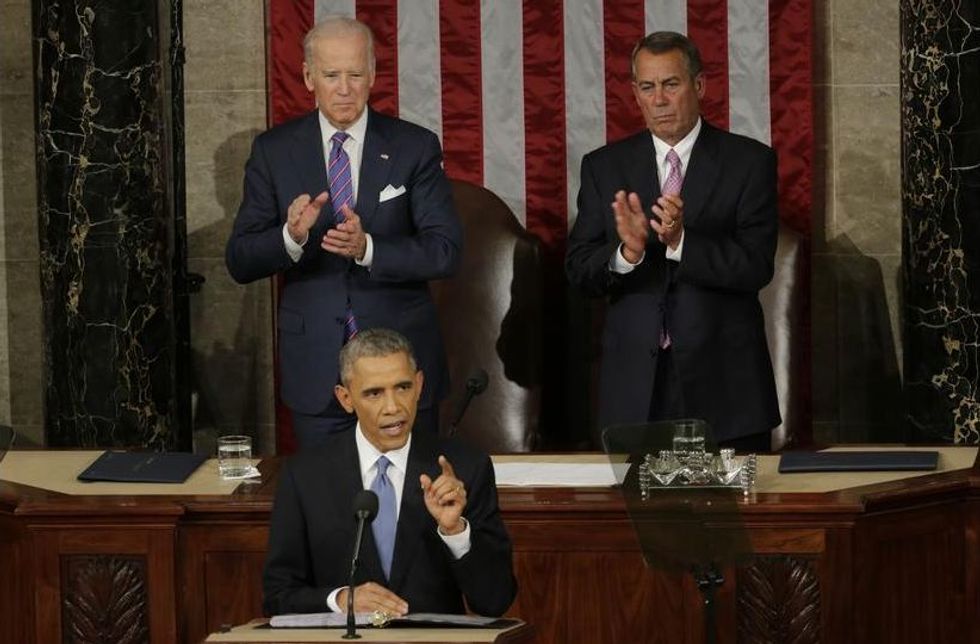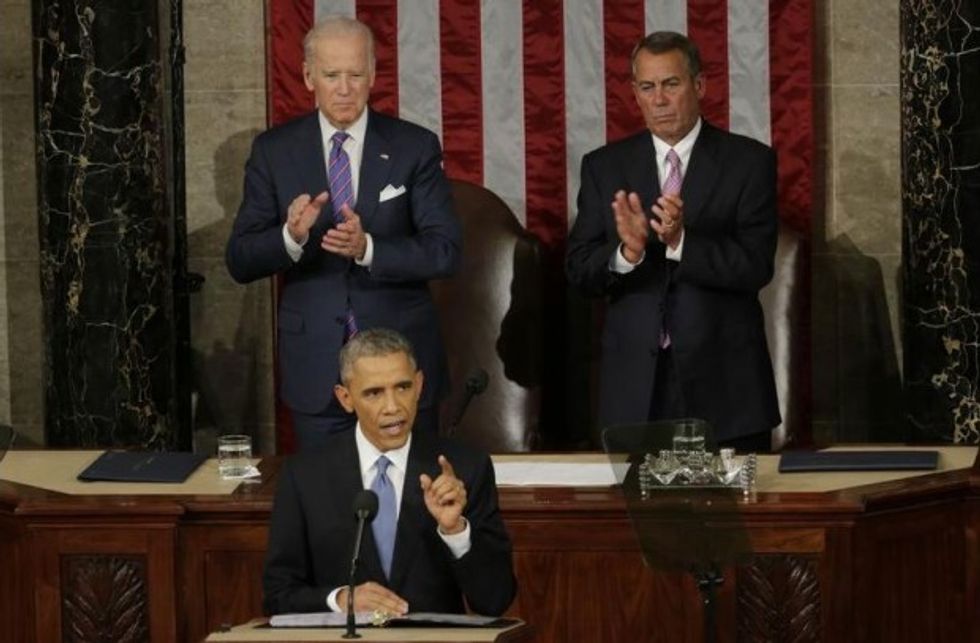President Barack Obama ignores the checks and balances built into U.S. government structure, acting as though the rule of law does not apply to him, to his minions or supporters. He protects his faithful from consequences of their dishonest or illegal acts.
President Obama has created a supra-legal presidency.
 Vice President Joe Biden and House Speaker John Boehner (R-Ohio) applaud President Barack Obama during his State of the Union address before a joint session of Congress. (AP Photo/J. Scott Applewhite)
Vice President Joe Biden and House Speaker John Boehner (R-Ohio) applaud President Barack Obama during his State of the Union address before a joint session of Congress. (AP Photo/J. Scott Applewhite)
Treaty With Iran
The president wants his treaty with Iran, despite its unfavorable terms that may endanger world peace. Congress opposes it, so do most Americans — however, neither the Constitution nor the will of the people will stop him from realizing his legacy.
Article II, Section 2, Clause 2 of the U.S. Constitution says, in part, that the president “shall have Power, by and with the Advice and Consent of the Senate, to make Treaties, provided two thirds of the Senators present concur.”
To understand the full extent of President Obama’s illegal behavior, read the Wall Street Journal's Sept. 10 editorial “Iran No Confidence Vote.” The Senate passed the Nuclear Agreement Review Act (aka the Corker-Cardin Bill) 98-1. The president signed it, committing him to allow Congress to review any Iran deal in its entirety before finalizing.
He then signed a “Sole-Executive Agreement” with Iran, parsing the word “treaty” into agreement. Finally, he browbeat his faithful Democratic senators (who themselves are skeptical of the deal) to filibuster, preventing a vote on a resolution to disapprove of his Iran “agreement.” Our supra-legal president made a terrible deal with a nation whose foreign policy is “Death to America.” He ignored the deal he made with Congress. He discarded the constitutional requirements and used a political gambit to circumvent both letter and intent of the law.
Immigration
One reason to have a federal government is to control our borders. Federal law requires individuals entering this country to go through a visa process. Those entering illegally are deported.
For the first three and a half years of his presidency, Obama deported more illegals (on a monthly average), primarily back to Mexico, than anyone before him. Shortly before the general election of 2012, he ordered a halt to all deportations. Neither Congress nor the Supreme Court had made any change to federal immigration law.
By what authority did President Obama negate the law?
His reason to stop the deportations was obvious and unapologetic pandering to the Hispanics, and it worked. His supra-legal action garnered him 71 percent of the 2012 Latino vote.
Bureaucrat Uber Alles
The Dodd-Frank 2010 banking and finance reform law created a bureaucracy, the Financial Stability Oversight Council. This agency gives Washington “investigative, prosecutorial, and adjudicative powers,” says the Wall Street Journal. The FSOC makes the Secretary of the Treasury not only the judge, jury and executioner, but also the investigating officer as well as the arresting officer.
The Obama administration acts as though separation of powers does not exist. This separation, enshrined in the Constitution, was intended by our Founding Fathers to prevent the concentration of power and thus avoid a return of the tyranny we rebelled against in 1776.
Concentration of Power, Upheld by SCOTUS
When Congress passed the Affordable Care Act, colloquially Obamacare, it said that only insurance exchanges “established by the state” could offer subsidies to American citizens. As the president wanted his federal (not state-established) exchange at healthcare.gov to provide insurance, he instructed the IRS to issue a ruling that healthcare.gov could distribute subsidies. In essence, he changed what his own ACA law said.
In King v. Burwell, the Supreme Court upheld Obama’s supra-legal decision. They elevated the executive branch of government over the legislative branch, thereby concentrating power in White House hands and reinforcing the president’s belief that he is above the law.
Presidential Appointees Untouchable
Why did former IRS bureaucrat Lois Lerner and other Obama appointees get away with their questionably legal acts? Because Obama's example to them as their leader encouraged them to ignore or subvert the law.
Lerner, the former director of the Exempt Organizations Unit at the IRS, specifically targeted conservative groups who were opposed to the president’s agenda. Liberal groups were left alone. Will Ms. Lerner ever be put on trial? Not a chance.
Hillary Clinton was Obama’s secretary of state from 2009 to 2013. When she ran State, did she properly defend and protect our ambassador and his staff in Benghazi, Libya, on the 10th anniversary of 9/11? Everyone knows the answer: Clinton was derelict in her duty. The consequence Clinton may suffer? She could be our next president, being the front-runner for the 2016 Democratic nomination.
In 2009, President Obama appointed Eric Holder to be attorney general, the country’s No. 1 upholder of the law. He cannot choose which laws he will defend or enforce. If it is federal law, the attorney general should defend and enforce it. Yet, Holder refused to fully enforce banking laws, used his office to spy on American journalists and was actually held in Contempt of Congress for refusal to hand over documents related to the Fast and Furious scandal. He decided what was the Law and what wasn’t.
Rule of the Pen
When President Obama said, “I have a pen and I’m not afraid to use it,” he was referring to more than just veto power. His pen also works for executive orders, memoranda, advisories, guidelines and an untold number of undisclosed communications.
Supporters have pointed to Obama’s alleged lower number of executive orders while detractors have emphasized the scope of his orders, much broader than previous presidents.
We should judge based on the data, using the president’s own publicly stated promise of the “most transparent” administration in U.S. history, with a “system of transparency, public participation, and collaboration.” However, it is hard to take the president seriously if we contrast his promises with his actions over the passage and implementation of Obamacare. Were all the backroom deals transparent? Can you call it “public participation” if most people oppose his namesake bill? Is it “collaboration” when you pass major social legislation over the opposition of every member of the then-minority, Republican, party? And is it truly a law if the president keeps changing it at his whim?
Finally, there is perception versus reality. Obama manufactured the appearance of transparency with his memorandum urging more FOIA releases, while he manipulated the White House Log of Visitors and Meetings to exclude those he wished to keep out of the public eye.
La Loi, C’est à moi.
In 1655, King Louis XIV of France intoned, “L’état, C’est moi,” meaning, “I am the state.” He believed that without him, there was no France. Four-and-a-half centuries later, President Obama might well declare, "La Loi, C’est à moi," which is loosely translated as, “The law is what I say it is.”
--
Dr. Deane Waldman MD MBA is author of “The Cancer in the American Healthcare System;” Professor Emeritus of Pediatrics, Pathology and Decision Science; and Adjunct Scholar (Healthcare) for the Rio Grande Foundation, a public policy think tank. Dr. Deane also sits on the Board of Directors of the New Mexico Health Insurance Exchange, as Consumer Advocate. Opinions expressed here are solely his and do not necessarily reflect the opinions of the Board.
 –
–
TheBlaze contributor channel supports an open discourse on a range of views. The opinions expressed in this channel are solely those of each individual author.

 Vice President Joe Biden and House Speaker John Boehner (R-Ohio) applaud President Barack Obama during his State of the Union address before a joint session of Congress. (AP Photo/J. Scott Applewhite)
Vice President Joe Biden and House Speaker John Boehner (R-Ohio) applaud President Barack Obama during his State of the Union address before a joint session of Congress. (AP Photo/J. Scott Applewhite)


